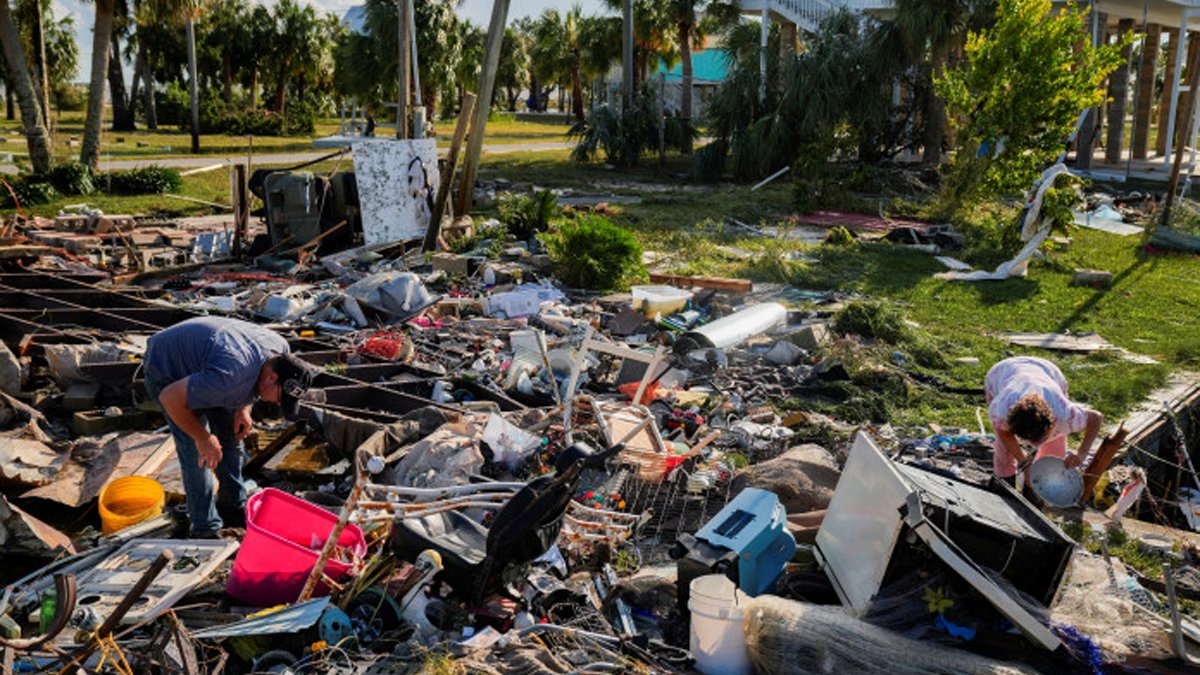Hurricane Idalia plowed into Florida’s Gulf Coast on Wednesday with howling winds, torrential rains and pounding surf, then weakened as it turned its fury on southeastern Georgia, where floodwaters trapped some residents in their homes.
Hours after Idalia slammed ashore as a powerful Category 3 hurricane at Keaton Beach in Florida’s Big Bend region, packing winds of about 125 mph (201 kph), authorities were still trying to assess the full extent of damage in the hardest-hit areas.
Video footage and photographs from the region around Idalia’s landfall showed ocean waters washing over highways and neighborhoods swamped by extensive flooding at midday. Power outages were widespread.
Fierce winds ripped down the roof of a gasoline station in Perry, a town of about 7,000 residents roughly 20 miles (32 km) inland and north of where Idalia came ashore, CNN video showed.
At a late afternoon news conference, Florida Governor Ron DeSantis said no hurricane fatalities had been confirmed and that it seemed most residents in vulnerable, low-lying areas had heeded evacuation orders and warnings to move to higher ground.
But the Florida Highway Patrol reported earlier in the day that two motorists died in separate rain-related crashes on Wednesday morning. DeSantis later said state authorities were investigating one unconfirmed storm-related traffic death.
INSURED LOSSES ESTIMATED AT $9 BILLION-PLUS
Insured property losses in Florida were projected to run $9.36 billion, investment bank UBS said in a research note based on preliminary estimates.
Still, Idalia appeared from early reports to have been far less destructive than Hurricane Ian, a Category 5 storm that struck Florida last September, killing 150 people and causing $112 billion in damage.
The governor said that as many as 565,000 utility customers had lost electricity at some point during and after the storm.
DeSantis was speaking in Perry, which along with other parts of Taylor County bore some of the storm’s worst damage. Electricity was out across the town, businesses were all shuttered and many homes were empty.
Florida Transportation Secretary Jared Perdue told the briefing that state National Guard teams were conducting water rescues from vehicles in Hernando and Taylor counties.
Here and there, residents were seen clearing fallen trees and limbs that littered yards and streets, making it difficult to drive through the town. Some homes and other buildings were left in shambles.
Thomas Demps, 80, a Taylor County commissioner, let out a long, stunned whistle and several exclamations of “Oh, my!” as he walked around Mount Olive Missionary Baptist Church in Perry on Wednesday afternoon.
The church took a beating, Perry said, with missing shingles, portions of outside walls torn away and water standing on the floor.
“This is the worst storm I’ve ever seen here, never seen it this bad,” said Demps, a retired industrial mechanic.
About 200 miles (322 km) to the south, at least 75 people were rescued from floodwaters in St Petersburg, Florida, municipal officials said on social media, with video showing two emergency workers in a small boat plying submerged streets through heavy rains.
As predicted, Idalia crossed Florida’s shoreline in the heart of its largely rural Big Bend region, where the state’s northern Gulf Coast panhandle curves into the western side of the Florida Peninsula. The area is roughly bounded by the cities of Gainesville and Tallahassee, the state capital.
The same region, featuring a marshy coast and threaded with freshwater springs and rivers, was devastated by a major hurricane in 1896.
Feeding on the warm, open waters of the Gulf Mexico as it churned toward Florida, Idalia gained after skirting western Cuba on Monday as a tropical storm.
The hurricane unleashed destructive winds and torrential downpours that were forecast to cause flooding up to 16 feet (5 m) deep along Florida’s Gulf Coast. Some 12 hours after landfall, the governor said no drowning victims had been found caught in the storm surge.
GEORGIA RESCUES
Florida’s Gulf Coast, southeastern Georgia and eastern parts of North and South Carolina were forecast to receive 4 to 8 inches (10-20 cm) of rain through Thursday, with as much as a foot of rain possible in isolated areas, the National Hurricane Center warned.
By early Wednesday afternoon, Idalia’s center had left Florida and moved into Georgia. State officials said they expected the storm to clear Georgia by 8 pm EDT.
In Valdosta, Georgia, about 80 miles northeast of Tallahassee, emergency boat crews were carrying out rescues of residents trapped in homes, according to the city’s Facebook page.
Cedric King, a businessman from coastal Brunswick, Georgia, just south of Savannah, was not going to take chances.
“I packed up the family and headed north,” he said after a five-hour drive with his mother, wife and children. “We evacuated.”
The storm’s most dangerous feature, officials warned, was a powerful surge of wind-driven seawater that flooded low-lying areas.
By midmorning, a storm monitoring station in Steinhatchee, 20 miles (32 km) south of Keaton Beach, showed waters reaching 8 feet (2.4 metres), well above the 6-foot (1.8-meter) flood stage.
In Hillsborough County, an area of 1.5 million people south of the Big Bend region that includes Tampa, crews were dealing with widespread damage and flooded streets, officials said in a news briefing.
Idalia attained Category 4 intensity on the five-step Saffir-Simpson wind scale early Wednesday before landfall, but by 7 a.m. had weakened into Category 3, the NHC said.
As it entered southeastern Georgia, Idalia’s wind speeds ebbed to 90 mph, reducing the tempest to a Category 1 storm. By 5 pm EDT, it weakened further into a tropical storm, the NHC said.







